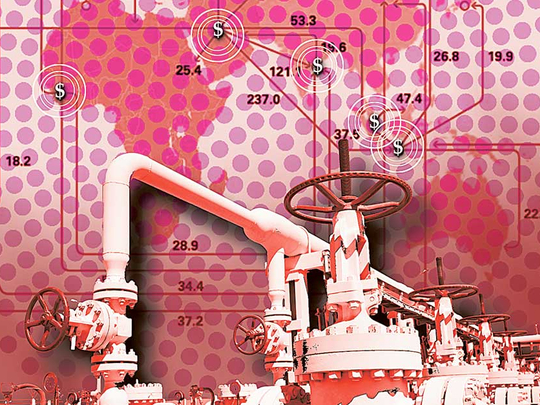
It’s hard to blame Russia for using its propaganda machine to help build a post-fact world when its economy depends on a post-fact market — the oil one. The market’s reaction to news from the Organisation of Petroleum Exporting Countries (Opec) highlights its spurious mechanics.
Bloomberg News reported recently that Russia as a country made $6 billion (Dh22 billion) just by talking to Opec about cutting its oil output: News about the negotiations drove up the price. Now, Russia has agreed to a cut by 300,000 barrels per day by January “if technically possible”. It looks like a lot — a quarter of the total cut Opec members have agreed among themselves — but then Russia’s output increased by 520,000 barrels a day between the end of August and the end of October, reaching an absolute record level.
Russia has been making money on the increasing price while growing production — the best of both worlds thanks to some deft news manipulation and nothing else. Now, even if Russia cuts output by about 2.7 per cent of the current level, as it has promised, it will still reap a profit if the price of crude holds at the current level — about 7 per cent higher on Thursday morning (December 1) than three days before.
That kind of gain is not commensurate with the real-world effect the production cut will have on oil inventories. As Bloomberg Gadfly’s Liam Denning calculated, by the end of the third quarter of 2017, Opec members’ full compliance with the November 30 deal can cut developed nations’ stock of crude to 56 days of forward demand from the current 65 days.
From a practical point of view, this means nothing at all: The world’s strongest economies will still have about two months’ supply of crude in reserve. To speculators, however, that’s a huge drop and an obvious trade.
If the current price doesn’t stick, Russia and the Opec countries simply won’t make the promised cuts. There’s no mechanism within Opec, and certainly none in the case of an outsider like Russia, to punish non-compliance.
Saudi Arabia used to operate an ad hoc mechanism, raising its own production to punish smaller rivals with lower prices, but the kingdom can’t do that effectively today without losing market share to Russia and the resurgent Iran. It’s because of the non-binding nature of the deal that the Saudis have, after a lot of hand-wringing, agreed to allow arch-rival Iran to increase rather than cut output.
For Opec and Russia, it’s a matter of finding a balance between the real-life cuts necessary to maintain market faith in a supply reduction and the price effect these cuts continue to have. If the effect is smaller than needed, the oil producers will make up for it by pumping more oil, as they have always done in the past: No Opec output-cutting deal has ever been followed to the letter.
They can always talk about cuts again in a few months: A price bounce is guaranteed. In contrast to ordinary people who eventually catch on to being fast-talked, oil traders don’t care as long as they have a story to trade on.
This is the ultimate fake news market — it’s even more lucrative than the political one, where voters’ reactions aren’t as predictably knee-jerk.
The Saudis and the Russians are masters of this game: The regimes, more than anyone else in the world, depend on being good at it. Problems begin when the US fracking industry, which consists of numerous non-state players, tries to ride on the big tricksters’ coattails.
When the frackers see prices go up, they start making optimistic plans and ratcheting up production. As soon as they achieve a significant increase, this gets reported, becomes a tradable story, prices go down and the state actors increase their output so they can still balance their budgets.
The frackers’ projections prove false, hedging becomes costlier, creditors and investors abandon them and they end up extracting less oil.
US crude output is now about 1 million barrels per day below the historic maximum achieved in June, 2015. Without any loudly announced deal, it has dropped by about as much as Opec now promises to take off the market by early next year.
What undercut it was the disconnect between the reality of extracting and selling physical oil and the virtual market that sets the prices. In that virtual market, state actors are the more confident players — like poker pros with bigger stacks of chips and serious skin in the game.
They can bluff successfully, and they can take some pain when necessary. The frackers are minnows at the big table — which doesn’t mean they can’t benefit in a small way from the state players’ largesse.
In the last month, US crude production has gone up by about 200,000 barrels a day. If it goes up much higher, though, and begins to affect prices, the frackers will find themselves on the receiving end of Opec and Russian punishment again as state actors try to make up for falling prices with more production.
Those who believe a deal has been made should also admit to believing every bit of nonsense Macedonian fabricators passed off as news during the US election campaign.












